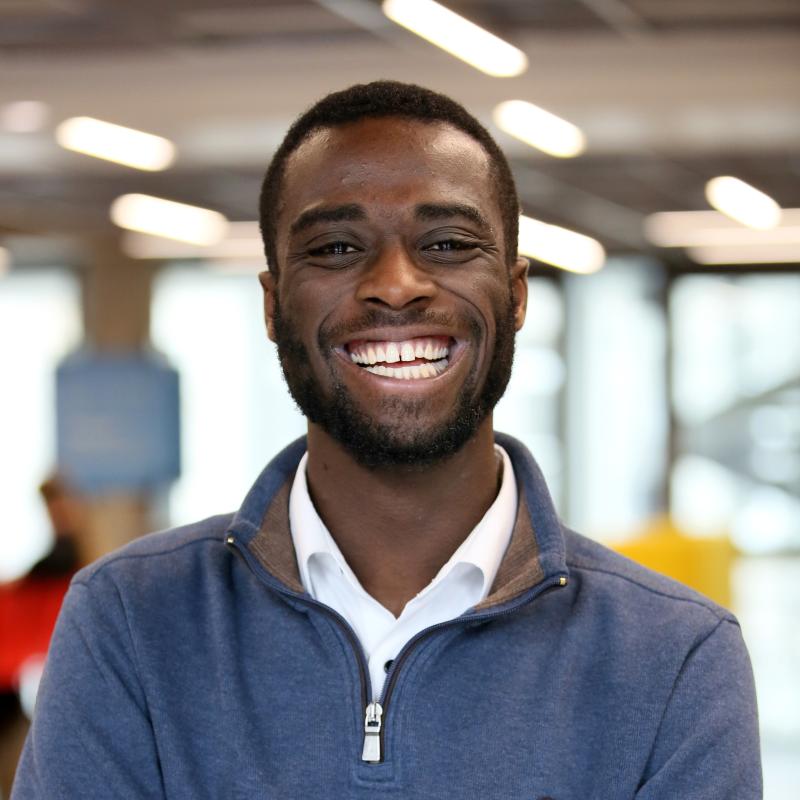Breadcrumb
Eric Ehigie came to the Master of Public Policy (MPP) with a law degree and strong history of social engagement in Ireland. A former board member of Women for Election, and Director of Advocacy for the grassroots organisation Black and Irish, he had long been wrestling with the question: how can we use public institutions and the law to shape a society that is more cohesive, inclusive and just?
His policy interests reflect the complexity of this challenge. At the heart of his work is a deep concern with how Ireland, and the broader West, navigates growing cultural diversity – and how societies can build cohesion amid backlash, populism and political division.
Despite his early achievements, Eric sensed there was more to learn when it came to understanding the public sector and its role in shaping meaningful social change. ‘I’d just come out of law school,’ he reflects.
I see the law as a vehicle for change. I wanted to be in a space that would help me understand how that change actually happens at the policy level.
That search led him to the MPP. But it wasn’t only the curriculum that convinced him. The alumni network – packed with people working to improve governance in countries around the world – made a lasting impression. ‘These were change-makers,’ he says. ‘People trying to make a difference. And I wanted to be part of that community.’
Eric also brought with him a specific political concern: the rise of anti-immigrant sentiment in Ireland. Protests and political rhetoric increasingly reflected a divisive undercurrent – one he believed wasn’t being adequately challenged by mainstream politics. ‘I don’t think the government has mounted the best response,’ he says. ‘Especially when it comes to engaging the working class, who often feel marginalised and left behind. I wanted to understand how we could think and respond differently.’
Once at Oxford, the experience went beyond his expectations – both intellectually and personally. ‘I knew it would be challenging. But I didn’t realise just how much it would stretch me. The multidisciplinary nature of the course, from economics to philosophy to law, forced me to think in new ways.’
But what stood out most wasn’t academic theory – it was the emphasis on people.
One thing I hadn’t expected was how much the course teaches you that politics is a business of people. You could know every book inside out, but if you're not able to relate to people, you're not going to be able to implement policy effectively.
That relational learning has been especially valuable in a cohort drawn from all over the globe. ‘I’m used to professors in Ireland teaching about Africa or Latin America from a distance,’ he says. ‘Here, I’m hearing from people who’ve been on the ground, who’ve experienced the issues first-hand – or even challenged them politically.’
The social and cultural exchange outside the classroom has also played an important role. ‘It’s been great to learn how people from different backgrounds relate to the world’, he shares. It’s challenged me in a good way – taught me how to connect with people who are very different from me.’
That ability to connect, he believes, is central to effective policymaking – particularly on issues such as immigration and national identity. In Ireland’s case, he believes there’s a special responsibility – and opportunity – to lead by example. ‘We’ve been the excluded ones. We were colonised. Irish immigrants in Britain and America were treated as subhuman, labelled as barbarians in scientific journals. We know what it’s like. So I hope Ireland can be a beacon – you don't have to lean into the worst of the human impulse when it comes to demonising the other.’
One course that has left a lasting impact is ‘Politics of Policymaking’, which introduced Eric to the power of narrative in social movements. ‘It helped me understand why someone like Martin Luther King Jr was so effective. He didn’t just present facts. He crafted a narrative that moved people emotionally.’
For those thinking of applying to the MPP, he has clear advice: ‘Have a vision for who you want to be when you leave the course. Know what you want to gain from it, and how it fits into your bigger goals. That clarity will strengthen your application – and your experience.’
And, he adds, don’t let doubt hold you back.
Most people I know didn’t think they’d get in. I didn’t either. But you have to believe in yourself. Let that belief come through in your application – and in how you show up once you’re here.
Eric is also keen to dispel the idea that the School is out of reach. ‘I am very grateful to be a George Moore scholar, which enabled me to come to BSG in the first place. On paper, access is a major issue for getting into an institution like Oxford, but in the case of BSG, the overwhelming majority of students receive some kind of funding – so don't let this deter your application, future student!’

